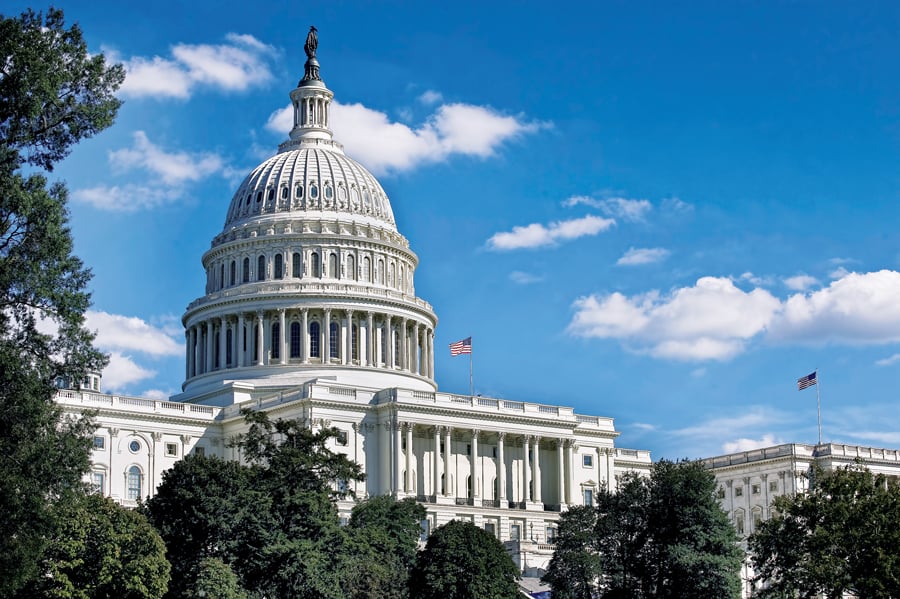Apollo Global Management and Ares Management are among the private-equity titans that scored a victory earlier this year when they persuaded Congress to let lending companies they control ramp up risk.
Now, as lawmakers engage in frantic negotiations to avoid a government shutdown, the industry is back in Washington seeking more.
At issue are business development companies, which provide loans to small and medium-size businesses and are part of a private lending boom that's exploded since the 2008 financial crisis.
As Congress debates year-end legislation to fund federal agencies, BDCs are urging lawmakers to add a measure that benefits their industry. The push is part of a broader lobbying campaign to get regulators to ease rules./assets/graphics src="/wp-content/uploads2018/12/CI1182371212.PNG"
Congress has already shown it's willing to help BDCs, which have financed a number of businesses in politicians' home states that struggled to get loans from banks. In passing an earlier spending bill in March, lawmakers attached a provision that allowed BDCs to
double their leverage — in other words, borrow more money to fund loans. While that change could make the companies more profitable, it would also exacerbate losses if the businesses they lend to default.
In recent months, Apollo and Ares have set their sights on the Securities and Exchange Commission. They want the agency to remove what they say is a key hurdle to BDC growth: Complicated regulations that make it difficult for mutual funds and other big money managers to invest in the companies.
As part of the industry's campaign, it's urging lawmakers to add a measure to the end-of-year funding bill that would force the SEC's hand, according to lobbyists and congressional staffers. But there are risks. Revamping SEC rules could expose more investors — including retirement savers — to the indebted businesses that BDCs lend to.
"The nature of the BDC model is to take credit risk, and at the next downturn, losses will absolutely pick up," said Jason Arnold, an analyst at RBC Capital Markets who follows BDCs. "But it isn't crystal clear how high those losses will be. And in the short term, this change would be a big plus for investors and the companies."
Apollo, Ares, KKR & Co., BlackRock Inc. and Goldman Sachs Group's asset management unit operate some of the biggest BDCs. The money managers profit by charging BDC investors fees for overseeing the companies' loan portfolios. BDCs manage a combined $97 billion, more than double their assets five years ago.
"The growth of private lending is good public policy — providing needed capital to middle market companies that drive GDP growth," Joseph Glatt, an Apollo BDC lawyer, and Joshua Bloomstein, an Ares BDC attorney, said in a joint statement.
A big portion of the cash used to finance loans is raised by listing BDCs on stock exchanges, where mom-and-pop investors can purchase their shares. Some of the largest public BDCs carry the names of their private-equity backers, such as Ares Capital Corp. and TPG Specialty Lending Corp.
Yet as a result of the SEC rules, if mutual funds buy stock, they have to include BDC operating expenses in the expense ratios that funds must calculate and disclose to prospective investors. Because that would force mutual funds to overstate their costs, the BDC industry says most funds shun their shares.
Adding to frustrations is that the SEC regulations have a similar impact on the expense ratios of broad equity indexes like those operated by Standard & Poor's and Russell. So indexes exclude BDCs, further restricting investment because many mutual funds and exchange-traded funds are set up specifically to track benchmarks.
In September, Apollo and Ares wrote a letter to the SEC laying out why they think BDCs should be exempt from the regulations, known as acquired fund fees and expense rules.
The rules are "misleading and materially overstate" operating costs, Mr. Glatt and Mr. Bloomstein said in their statement, speaking on behalf of a BDC trade group they founded. While they've sought support from lawmakers, Mr. Glatt and Mr. Bloomstein said their primary focus is getting the SEC to act.
The SEC didn't respond to a request for comment.
Rep. Steve Stivers, an Ohio Republican who's sponsored legislation that would require the SEC to reexamine it rules, said there's a good chance Congress will give BDCs relief in the year-end spending bill because the issue isn't "controversial."
Still, there are major political hurdles. With President Donald J. Trump bickering with Democrats over funding for his wall along the U.S.-Mexico border, financial firms could face long odds on getting items from their wish lists added to any legislation.
But even if the BDC provision isn't included, Mr. Stivers said he believes "Congress will continue to pressure the SEC." In a statement, he added that "the SEC has seemed amenable to working with Congress to address this issue."
Private-equity firms have given lots of money to politicians over the years, and that should help them get what they want on BDCs, said Isaac Boltansky, a financial regulation analyst at Compass Point in Washington.
"Muscle and money always helps," he said.
(More: Nontraded BDC sales in worst year since 2010)







